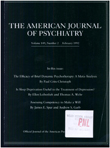Eye tracking impairment in clinically identified patients with schizotypal personality disorder
Abstract
Eye tracking accuracy, which has been found to be impaired in schizophrenic patients and their relatives, was assessed in 26 patients with schizotypal personality disorder, 17 control subjects with other non-schizophrenia-related personality disorders, 29 normal control subjects, and 44 schizophrenic patients. Both schizotypal and schizophrenic patients, but not control subjects with other personality disorders, demonstrated significantly more impaired tracking than the normal control subjects. These results suggest that patients with clinically defined schizotypal personality disorder may be biologically related to schizophrenic patients as part of a spectrum of schizophrenia-related disorders.
Access content
To read the fulltext, please use one of the options below to sign in or purchase access.- Personal login
- Institutional Login
- Sign in via OpenAthens
- Register for access
-
Please login/register if you wish to pair your device and check access availability.
Not a subscriber?
PsychiatryOnline subscription options offer access to the DSM-5 library, books, journals, CME, and patient resources. This all-in-one virtual library provides psychiatrists and mental health professionals with key resources for diagnosis, treatment, research, and professional development.
Need more help? PsychiatryOnline Customer Service may be reached by emailing [email protected] or by calling 800-368-5777 (in the U.S.) or 703-907-7322 (outside the U.S.).



